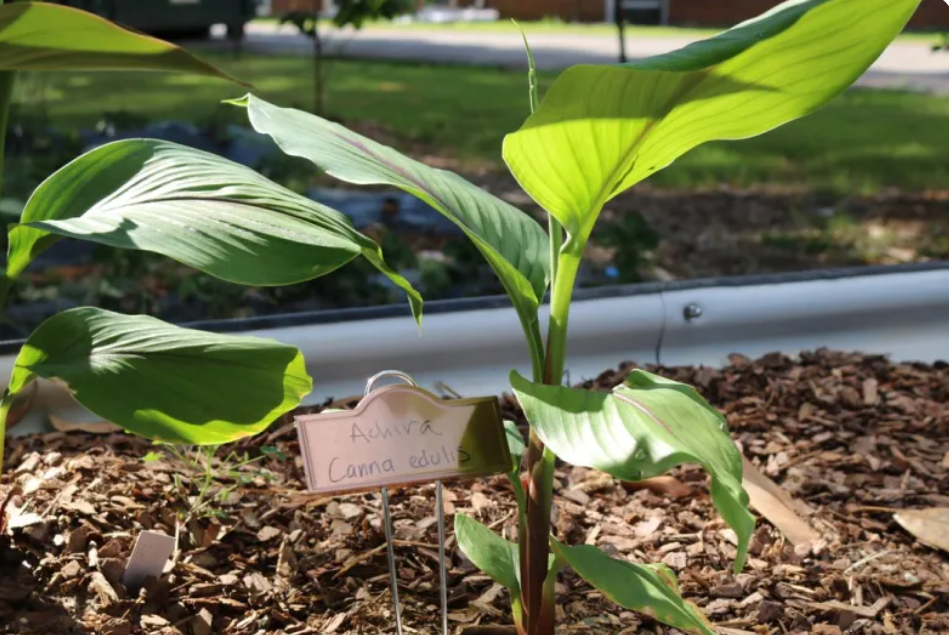Students at one of the nation’s HBCU crown jewels learn about the healing properties of working with the soil — and reconnecting with the heritage of Black farmers.
by Denim Fisher
Overshadowed by the spectre of enslaved field labor, Black people have always had a natural connection to the land. A program at Spelman College aims to enhace that connection while helping feed the community.
From the first group of enslaved Africans who dug into North American soil, Black people have had a special relationship with agriculture, nurturing crops from the land. Yet the inability to own the farms or gardens they cultivated — or having land they owned snatched away from them — has frayed and broken that bond across generations.
But a dedicated instructor tending to a small patch of land on the campus of Spelman College, a historically Black women’s school in Atlanta, aims to restore the connection. Working in a garden that dates back more than a century, Black women are learning the healing properties of working with the soil to grow and cultivate healthy food.
LEARN MORE: Reckoning With Racism, Even at a Haven Like Spelman
The Spelman Victory Garden has “a rich historical culture,” says Ivori Schley, Spelman’s garden educator and specialist. That heritage, she says, “just plays a lot into the storytelling, the place keeping, the conversation of Black women manipulating the soil, manipulating our resources to feed the community. So it’s a very big deal.”
Strong Legacy, Painful History
Given the history of Black people enslaved to work on plantations, however, gardening and planting has a negative connotation among Black people, Schley says. While we should acknowledge the painful history of forced labor in the fields, she says, it should not overshadow the legacy of Black herbalists and gardeners who understood the importance of nature, even during enslavement.
“You definitely have to challenge yourself to defy the social norms, social societal standards,” she says. “We are taught that man is separate from nature, but from an African, Afro, Indigenous lens, I cannot be farther from the tree. You treat this like your cousin, accordingly. In terms of Spelman students, definitely challenge yourself to go outside.”
Gardening is a communal practice that Black people have long utilized to heal, particularly in hard times. At Spelman College, the Victory Garden, first planted in the early 1900s, has been a vital force for nurturing the Atlanta school’s students and neighbors not long after the school’s founding in 1881. It has also continued even as official government policy strained the bonds between Black Americans and the land.
Most people with even a baseline knowledge of Black history have heard of Special Field Order 15, a Civil War-era directive that granted newly-emancipated Black people 40 acres of land to cultivate and a mule to help them till it. President Andrew Johnson revoked the order, effectively wiping out an opportunity to work the land and build generational wealth.
Disappearing Land
By 1910, government data shows Black farmers owned 16 million acres of land, but by 2017 that number had plunged to just 2.9 million acres. The decrease illustrates the political and persistent struggle of land ownership by Black people.
“Black and Indigenous farmers have been denied land ownership access for forever,” she says. “There’s been so many lawsuits against the USDA for racial discrimination.”
In 2023, the Justice for Black Farmers Act was introduced to fund historically Black colleges and universities to introduce careers in agriculture and related fields as well as to rectify Black land ownership issues.
“It’s very unique and special that Spelman has an urban garden, considering who has access to land,” Schley says. In recent years, she says, “there has been a surge in the food justice, environmental justice movement. How can we reclaim the narrative for our health and how we interact with nature? Farming is more than slavery.”
“Nature is probably the freest therapy — to put your hands in the soil, to walk on the earth, to get that electromagnetic frequency to ground us, to heal us,” says Schley. “But in order for farming to be successful, in order for farming to work, you need community.”
At the Victory Garden, there is an emphasis on growing different kinds of food beyond conventional crops. Along with black-eyed peas, tomatoes and okra, the garden will include Egyptian lettuce and Palestinian spinach.
“It’s a global conversation,” she says.
This diasporic conversation expands the knowledge of garden volunteers, in fact, a layered ancestral connection is taking place in this very garden between the crops and participants.
“More Than Slavery”
“People are really surprised just how soothing or therapeutic the simplest task can be.” When students are reluctant or uncertain to step into the garden, “just explore, you may be very surprised, of like, how good, how nourishing that is for your soul.”
RELATED: Art, Curation and Racial Healing at Spelman College
“Life is a little rocky right about now, politically, there’s casual disarray here and there, or just so much extra external influences trying to dictate and determine our lifestyles. But there are still things we can claim for ourselves, and that’s where food sovereignty, food justice comes in, specifically for Spelman students, this garden is so necessary and special,” says Schley.
The industrial agriculture system needs to be both dismantled and disrupted and instead, the focus needs to be on small gardens because they aid with sustaining community efforts.
“When you don’t center nature, you’re just more susceptible to the rat race,” Schley says “You’re more susceptible to the grinding culture of colonialism.”


